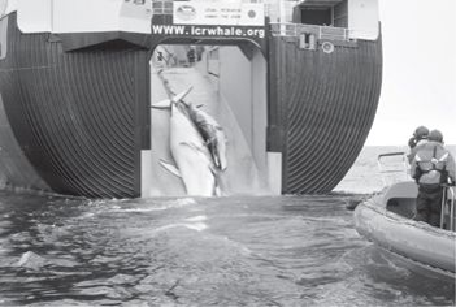Geography Reference
In-Depth Information
Japanese company viol and scientific understandingk
In June 2010, Australia began proceedings against the Japanese government in the ICJ,
arguing that the continued whaling programme is in violation of obligations undertaken by
Japan regarding whaling and marine mammal protection. Japan will no doubt argue that
'scientific whaling' is permissible under the terms of the International Convention for the
Regulation of Whaling (Article 8), and that there are no agreed coastal states in the
Antarctic to enforce national whaling sanctuaries. With the help of non-governmental
organizations such as the Sea Shepherd Society, which has a track record of directly
confronting Japanese whalers (raising an interesting question about whether this does
violate the terms of the Antarctic Treaty pertaining to peaceful purposes), Australia is
perhaps hoping to internationally shame Japan rather than secure a definitive legal judgment
in its favour.
The final resource issue that might be problematic in the future is perhaps the least well
publicized. While public opinion is well versed in the whaling debate, the same cannot be
said for biological prospecting. Scientific investigation of fauna and flora is generating
commercially valuable information on genetic and biochemical resources. Anti-freeze
proteins, krill oil, and food-related products have all been generated from Antarctic-related
research activities. It is estimated that something in the order of 200 companies and research
organizations including Du Pont, Oxford University, and Unilever are involved in biological
prospecting. Over 25 states are represented, including the United States, Japan, China, India,
the United Kingdom, and Russia; a mixture, therefore, of claimant and non-claimant states
alike. Antarctic krill have produced rich pickings, and Japan is one of the largest operators

